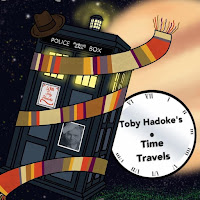My piece, "David the Goliath" (pp. 23-25) is on the thesis that without David Whitaker as story editor, Doctor Who would never have survived its first year. I endeavoured to be objective in my biography; here, I was asked to let rip.
The DVD includes an animated version of "A Meeting on the Common", the first chapter of David's 1964 novelisation Doctor Who in an Exciting Adventure with the Daleks, itself adapted from the TV serial that comprises Doctor Who episodes 5-11. The animation, effectively a new opening for all of Doctor Who, is directed and animated by Mel Meanley, adapted by Ian Winterton and stars Stephen Noonan as the Doctor, Adam Grayson as Ian, Helen Stirling-Lane as Barbara and Kerry Ely as Susan. Here's the trailer:
In my book, I discuss why this meeting takes place on Barnes Common and the elements of David Whitaker's real life that fed into it. In fact, the new animation is not the first dramatised version of this material, as I learned from The John Nathan-Turner Production Diary 1979-1990 by Richard Molesworth (Telos, 2022). Richard was then kind enough to let me have sight of the original paperwork.
In the summer of 1981, Philip Lewis - a BBC employee based in Room 4, 16 LS at Broadcasting House in London - wrote to Doctor Who producer John Nathan Turner about a script he (Lewis) had written for 'Episode 1' of Doctor Who and the Daleks, adapting the early chapters of David Whitaker's novelisation as an audio play. Lewis wanted the producer's permission to allow the Studio Amateur Dramatic Group (SADG) of the BBC Club to record this, on the proviso that it would be made by and played for club members only, and was not intended for broadcast. The idea was to use it as an exercise in adapting a novel for radio. Lewis assured the producer that the Daleks didn't feature - i.e. the episode concluded before they made their first appearance.
Replying on 4 June, Nathan Turner agreed in principle that this project could go ahead but wanted to check with Martin Hussey, merchandising assistant at BBC Enterprises, whether the project needed the blessing of Roger Hancock, agent of Dalek creator Terry Nation. The producer forwarded Hussey the script the following day; a copy of his covering memo survives. There's no record of a reply and the script doesn't seem to have been returned, so is not included in the Nathan Turner archive.
Staff at the BBC's Written Archive Centre were unable to locate a copy of the script or any further details about this production. No recording, cast list or other paperwork is known to survive. I've also drawn a blank in trying to trace Philip Lewis; he's surely not the man of the same name who was a long-serving TV producer for BBC Midlands and created Pot Black.
But if SADG recorded a version of the script by Lewis, it may well have been technically accomplished. SADG helped BBC staff learn key skills in production. For example, Bob Wood was a senior clerk working in the current recordings retention unit at Broadcasting House in the 1960s, but joined this (and other) groups:
"At SADG, I learnt to be a radio studio manager and producer, eventually becoming their technical training officer and winning a technical trophy ... In 1970, after successfully completing the POA/SM training course, I left London and moved to Glasgow as a radio studio manager at BBC Scotland." (Bob Wood, "BBC hostels & the summer of love", Prospero issue 6 (December 2018), p. 8.
UPDATE!
I’ve been in touch with Philip Lewis, who now works as a voice artist with credits including a radio announcer on Emmerdale. You can find out more (and employ him!) via his website.
So, what about his adaptation of Doctor Who and the Daleks?
“As far as I know, it never got recorded,” Philip tells me. “At least not with my involvement. And I don’t have a copy of the script. In the intervening years I’ve moved house a number of times.”
But why adapt this particular Doctor Who novelisation, which was then 17 years-old? “The answer to that lies in the letter I wrote to the then producer – basically it was an exercise in adapting a book for radio. I seem to remember around that time I did several partial adaptations of other books and Doctor Who was just one of them.
“And no, I’m not the Philip Lewis who produced Pot Black, although I did meet him once.”
Thanks to Philip, and also to Richard Bignell.




















































